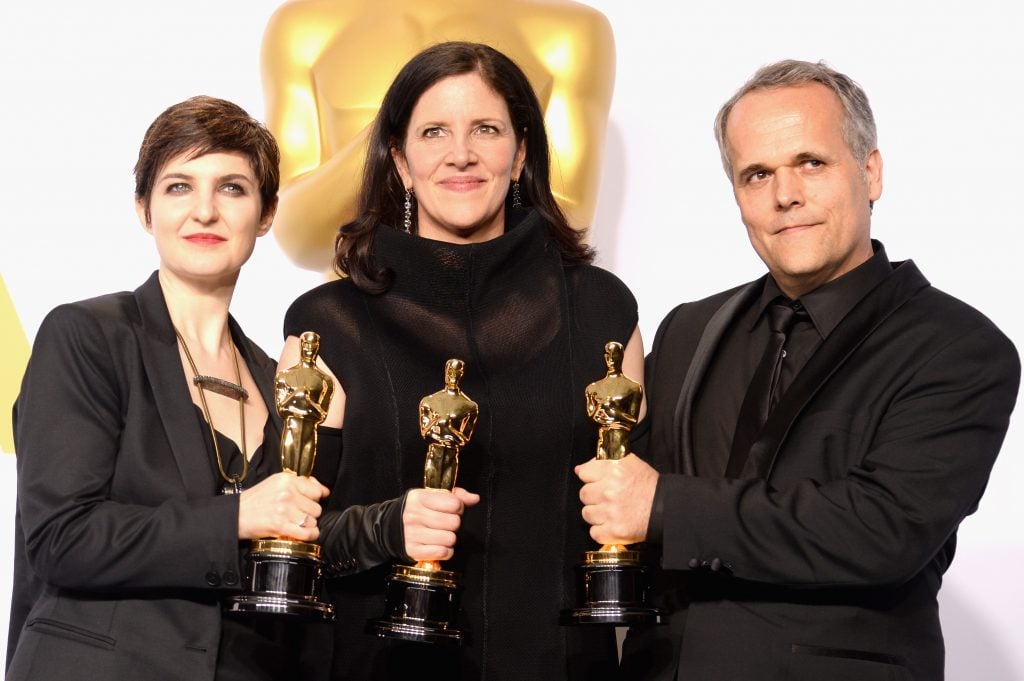Galleries
Edward Snowden Documentary ‘Citizenfour’ by Art World Darling Laura Poitras Triumphs at the Oscars
The Oscar is Snowden's biggest endorsement yet.

The Oscar is Snowden's biggest endorsement yet.

Hili Perlson

The Edward Snowden documentary Citizenfour won the Academy Award for Best Documentary on Sunday night. Director Laura Poitras collected the award together with lawyer and journalist, Glenn Greenwald, and was joined on stage by Snowden’s girlfriend, Lindsay Mills. The film chronicles Greenwald’s meetings with whistleblower Edward Snowden in a Hong Kong hotel in 2013, in the days leading up to the revelations about digital government surveillance in the Guardian and the Washington Post.
Amongst the films nominated for the Oscar in the same category was Wim Wenders’s documentary The Salt of the Earth, about legendary environmental and social documentary photographer Sebastião Salgado (see Will Wim Wenders Documentary on Sebastião Salgado Win Big at the Oscars?).
Poitras thanked Snowden for his bravery and personal sacrifice: “The disclosures of Edward Snowden don’t only expose a threat to our privacy but to our democracy itself. When the decisions that rule us are taken in secret we lose the power to control and govern ourselves.” She added: “I share this award with Glenn Greenwald and the many other journalists who are taking risks to expose the truth.”
Actor Neil Patrick Harris, who hosted the Oscars, joked that Snowden couldn’t attend the ceremony “for some treason.” But, Snowden is actually not being charged with treason; the government seeks to prosecute him under the Espionage Act.
A Statement From Snowden
Upon receiving news of the award, Snowden released a statement writing, “When Laura Poitras asked me if she could film our encounters, I was extremely reluctant. I’m grateful that I allowed her to persuade me. The result is a brave and brilliant film that deserves the honor and recognition it has received. My hope is that this award will encourage more people to see the film and be inspired by its message that ordinary citizens, working together, can change the world.”
Guardian defense correspondent, Ewen MacAskill, who also stars in the film, offered his interpretation of the triumph: “Good news for Laura. Good news too for Snowden: he can treat the Oscar as one of his biggest endorsements yet.”
Indeed, the Academy Award might be the most significant endorsement the people behind Citizenfour could have wished for, but it was certainly not the only one. The film has collected a slew of important awards over the last few months, including Best Documentary at the Baftas, and awards from the New York Film Critics Circle, the Directors Guild of America, and the National Society of Film Critics.
Artist and writer, Trevor Paglen, known for his extreme telephoto images of stealth drones, (see Trevor Paglen Wins Electronic Frontier Foundation Award and Trevor Paglen Photo of UK Surveillance Center Adorns Tube Platform) was in charge of the film’s cinematography.
Art Publications Respond
The film has also been widely praised in art publications, with Frieze Magazine’s co-editor Dan Fox listing it as a 2014 highlight, centered on one of the “defining political stories of our age.” He writes, “Here is a subject that needs no embellishment, no artistic lace doilies. Citizenfour will be seen in the future as an exceptional piece of primary historical evidence. I left the cinema stunned by the courage of those involved in breaking the story, and in the production of this film.”
The film’s title refers to the pseudonym Snowden used when he first contacted Poitras asking her to set up an encrypted line for their communication. It is an important historical document filmed almost entirely in the hotel room in Hong Kong where Snowden, a former NSA contractor who’s left his girlfriend and entire life behind, met with Greenwald and MacAskill to reveal the far-reaching NSA spying scandal.
The film also includes scenes of Snowden preparing to leave the hotel to go into hiding after the first NSA stories were published, along with a video interview in which the whistleblower revealed his identity. Snowden eventually managed to slip out of Hong Kong and, after becoming stranded in Moscow’s Sheremetyevo airport, was offered political asylum in Russia, where he currently resides. He was joined there by Lindsay Mills.
The Guardian and the Washington Post published the leaked information simultaneously in June 2013, with both publications winning a Pulitzer Prize in 2014 for Public Service.
The non-profit gallery Artists Space in SoHo, New York, showed Poitras’s 9/11 Trilogy, of which Citizenfour is the final part, from December 14, 2014 through February 15, 2015. The trilogy also includes the features My Country, My Country (2006), and The Oath (2010). Together with Citizenfour, the trilogy documents and addresses the expansion of the security state in the aftermath of 9/11.
Poitras, who studied film at the San Francisco Art Institute and political theory at The New School before turning to journalism, will have a solo exhibition at the Whitney Museum in 2016.